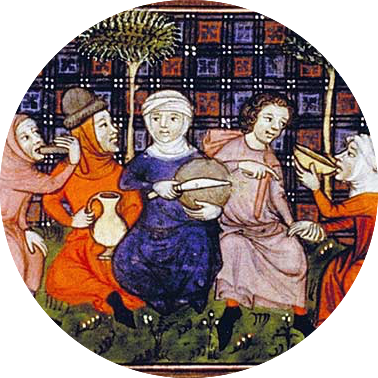French culinary identity: the emergence of a national culture of cuisine
 Cuisine is an important site of cultural identity creation. It is integrally linked to ideas of nationhood and identity. French culinary identity has developed over a long period, often influenced by social and political events.
Cuisine is an important site of cultural identity creation. It is integrally linked to ideas of nationhood and identity. French culinary identity has developed over a long period, often influenced by social and political events.
Developing strong links amongst citizens is integral to the development of national identity. Political agendas and social ideals are formed through cuisine and cookbooks are an important tool of cultural knowledge. The development of French culinary identity has been a long process, beginning from before Christopher Columbus’s introduction of spices and American foodstuffs to Europe.
Revolutionary French cuisine: let them eat cake…and other good things
The French Revolution (1789-99) has influenced the French national identity the most, as a result of the way politics and food combine. Meaghan Trewin notes that before the Revolution, meals strictly defined personal status. Nobility at the court of Versailles dined on tender white meat while peasants ate boiled meat and vegetables with bread.

The fall of the aristocracy established the ‘metonymic’ French cuisine wherein haute cuisine and regional cuisine were no longer separated. The new cuisine grouped various cooking techniques and recipes – emblematic of the new French society.
A new French culinary identity
Antoine Carême (known for his extravagant desserts and pastries) championed this new French culinary identity. Carême codified the globally recognised French cuisine that is widely celebrated today. His book ‘L’art de la cuisine française au dix-neuvième siècle’ (1833) included regional recipes and cooking advice
The newly established French culinary identity brought the traditions of the regions and of the grand chefs together. So strong was this new culinary identity that the culinary world has for hundreds of years identified French cooking as being timeless – and delicious. French sauces and the delicacy of their flavours are among the most noteworthy of French cuisine elements.
Food: the great unifier
Emerging from post-revolutionary France, a need to unify the citizens through food and a French culinary identity became clear. Ultimately France forged a powerful and enduring culinary image. It is incredibly popular and chefs and restaurateurs throughout the world actively promote French food culture.
In 2010 UNESCO deemed French cooking techniques to be of great importance to the world’s cultural heritage. For patrons in Australia and the world over, it is the uniformity of the French national cuisine that continues to be intriguing, with the popularity of French culture yet to wane.
What do you think makes French culinary identity and cuisine culture so unique? Do you think it lives up to the hype? Join the conversation below.
Image credits:
- Livre du roi Modus et de la reine Ratio, 14th century. via wikipedia.
- Carte gastronomique de la France, Jean François Tourcaty. via wikimedia.
- Antoine Carême. via wikipedia.
- La Partie Carée, James Tissot. via wikimedia commons.









Hard to imagine Australia doing the same thing – we have SO many influences! Good restaurants will always follow the ‘true’ French culinary identity, but I feel France – particularly Provence – is becoming an international ‘melange’ like everyone else these days, though it still has its ‘socca’ and ‘pissaladiere’. What I take from French cooking is a real appreciation of ingredients – fresh food, starting from scratch, (ie where it is grown) – and using fewer in order to bring out the special flavours of each.
I agree with you Jan that it is the tradition of strong flavours and techniques which keeps drawing patrons to French restaurants. In Melbourne, I have noticed an increase in boulangéries and restaurants focused solely on the simple classic treasures of French cuisine – whether it be a croissant or canard à l’orange.